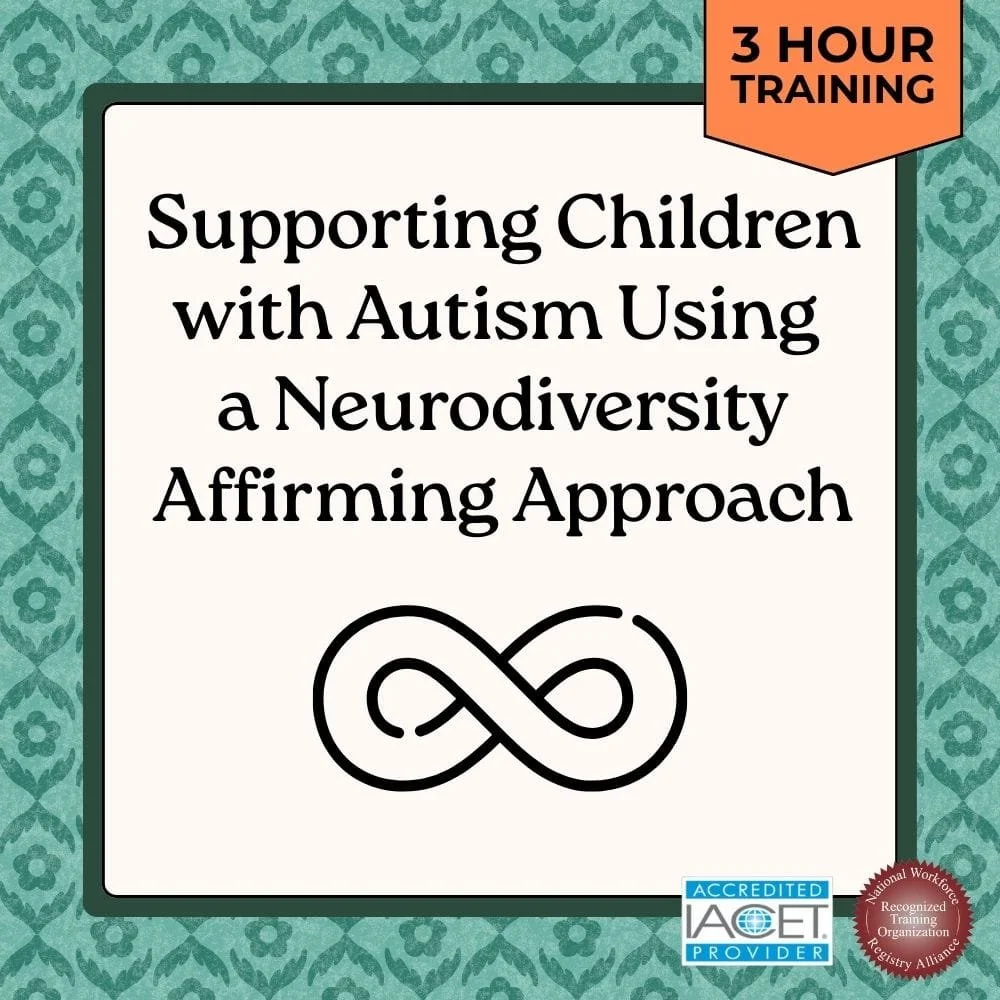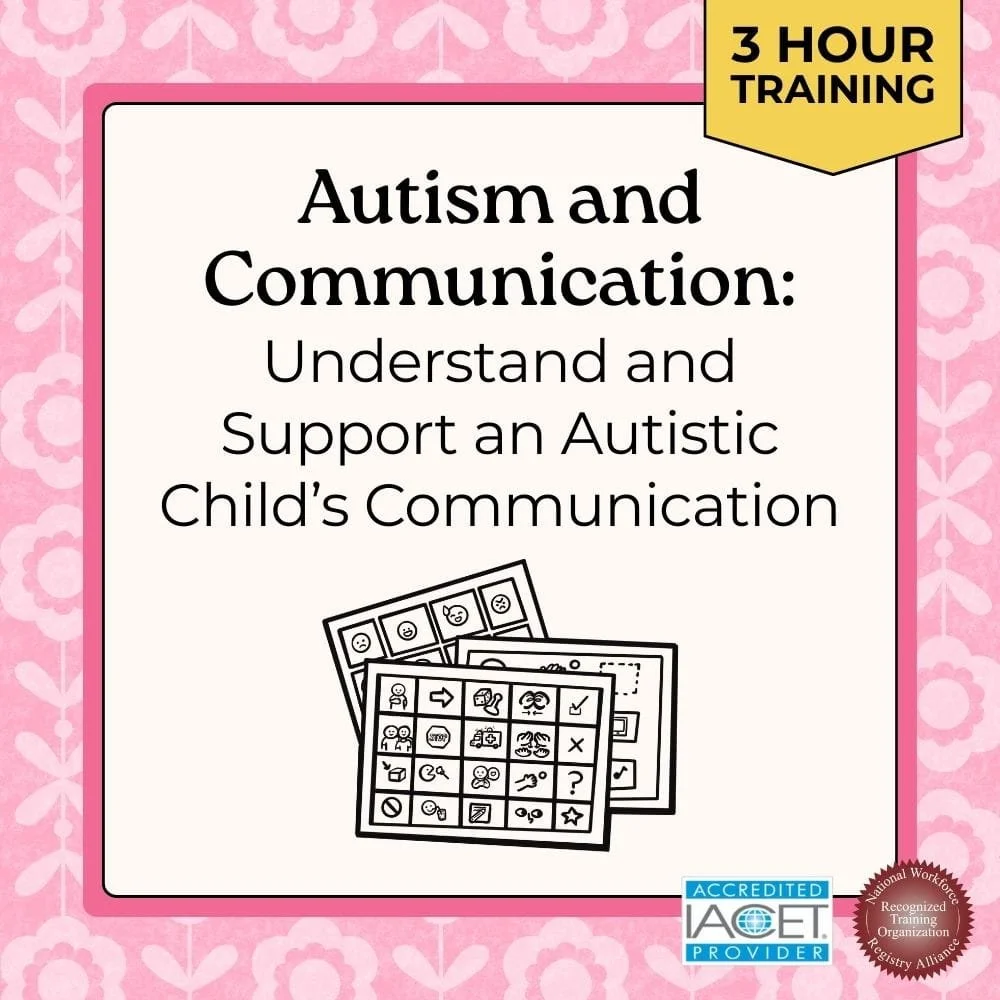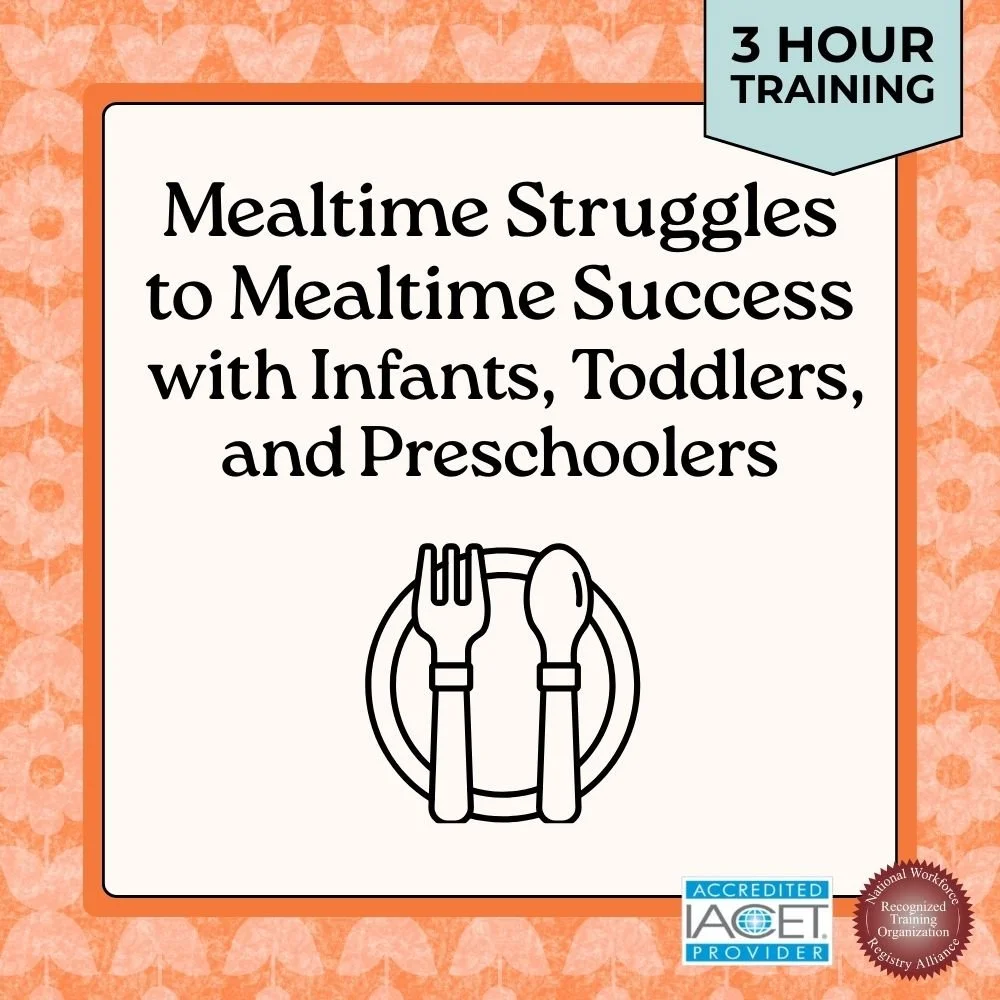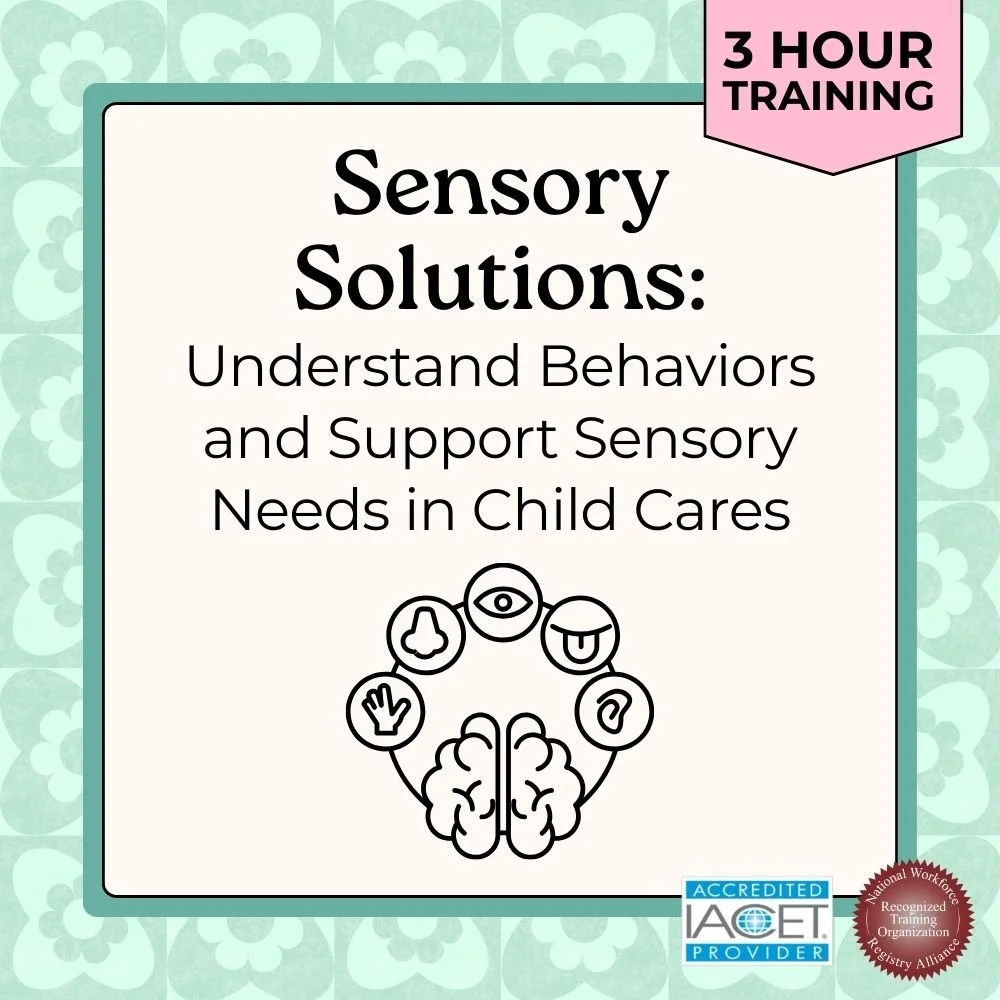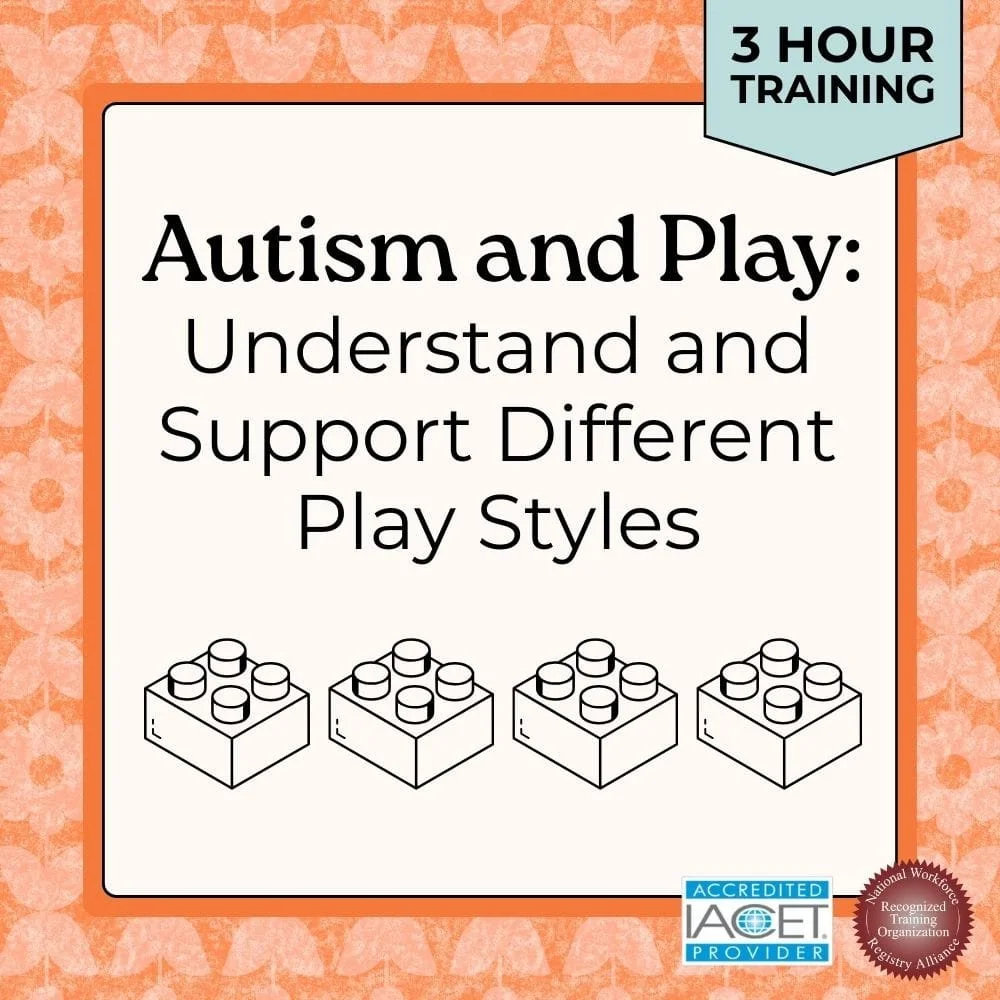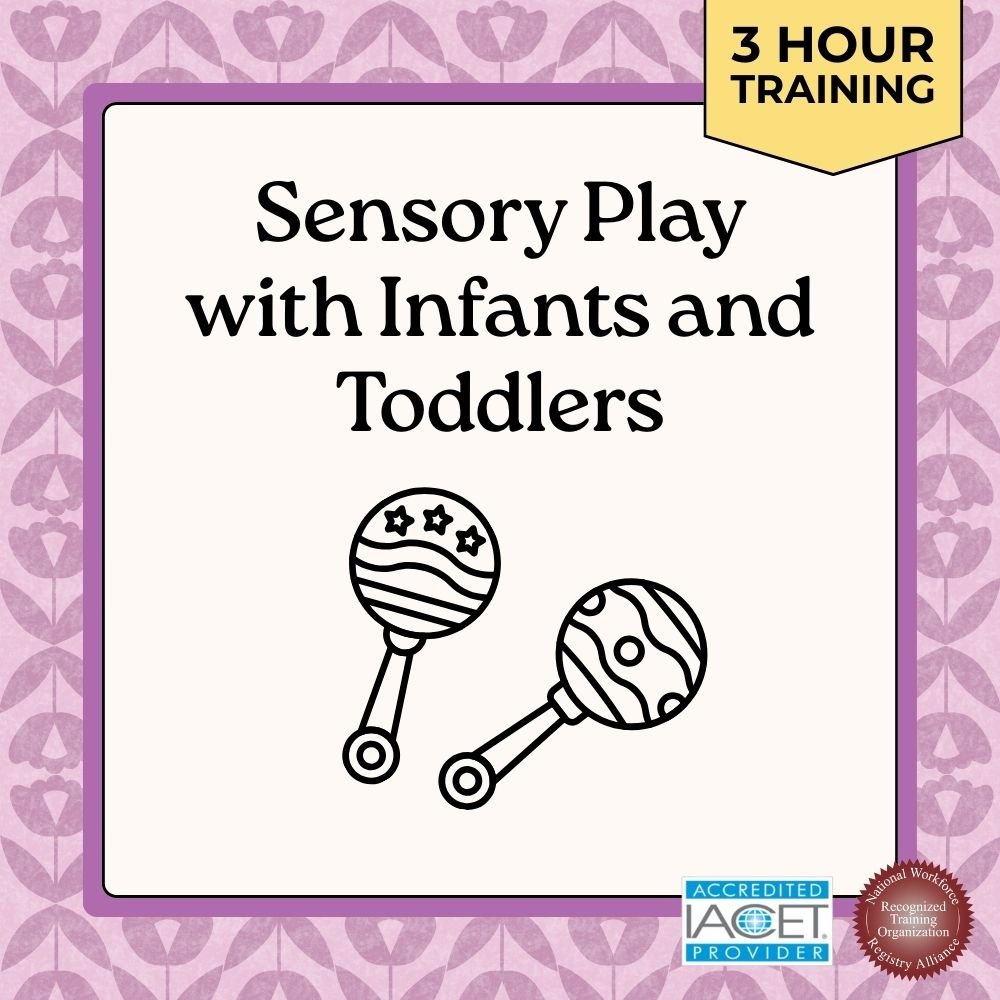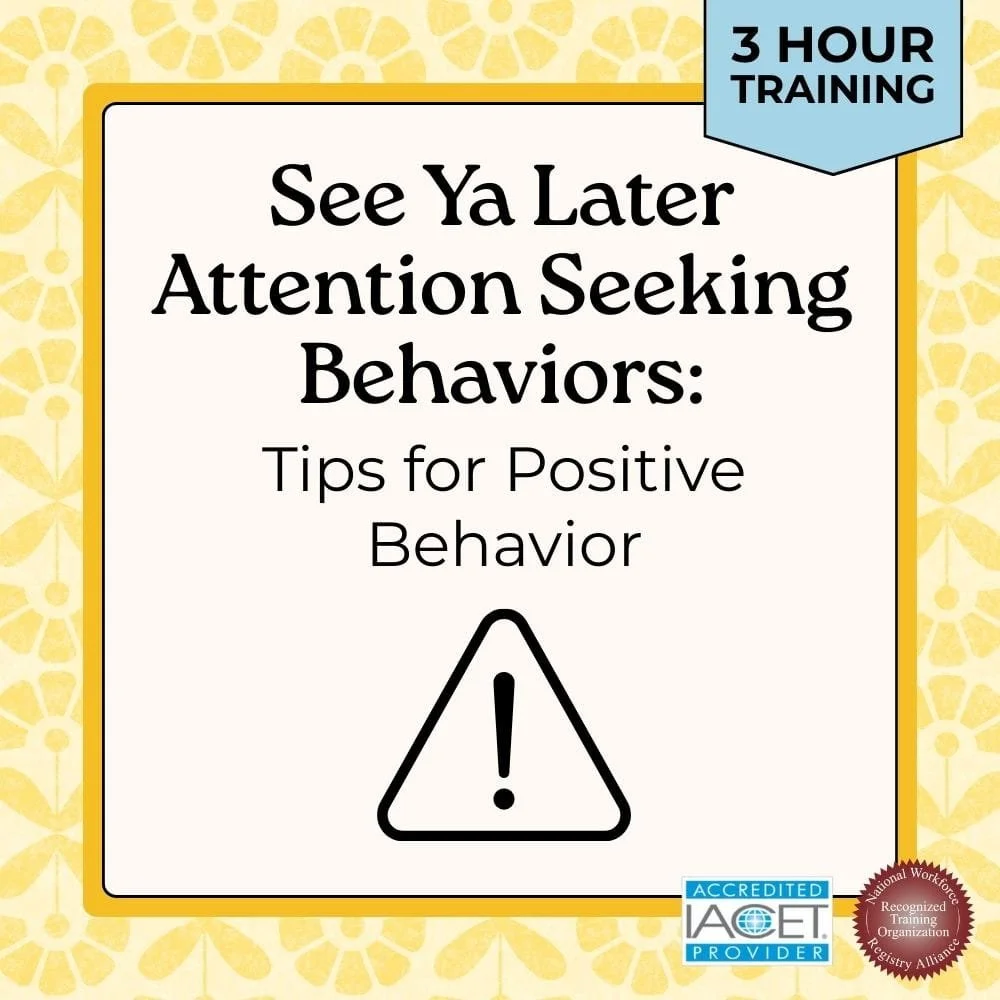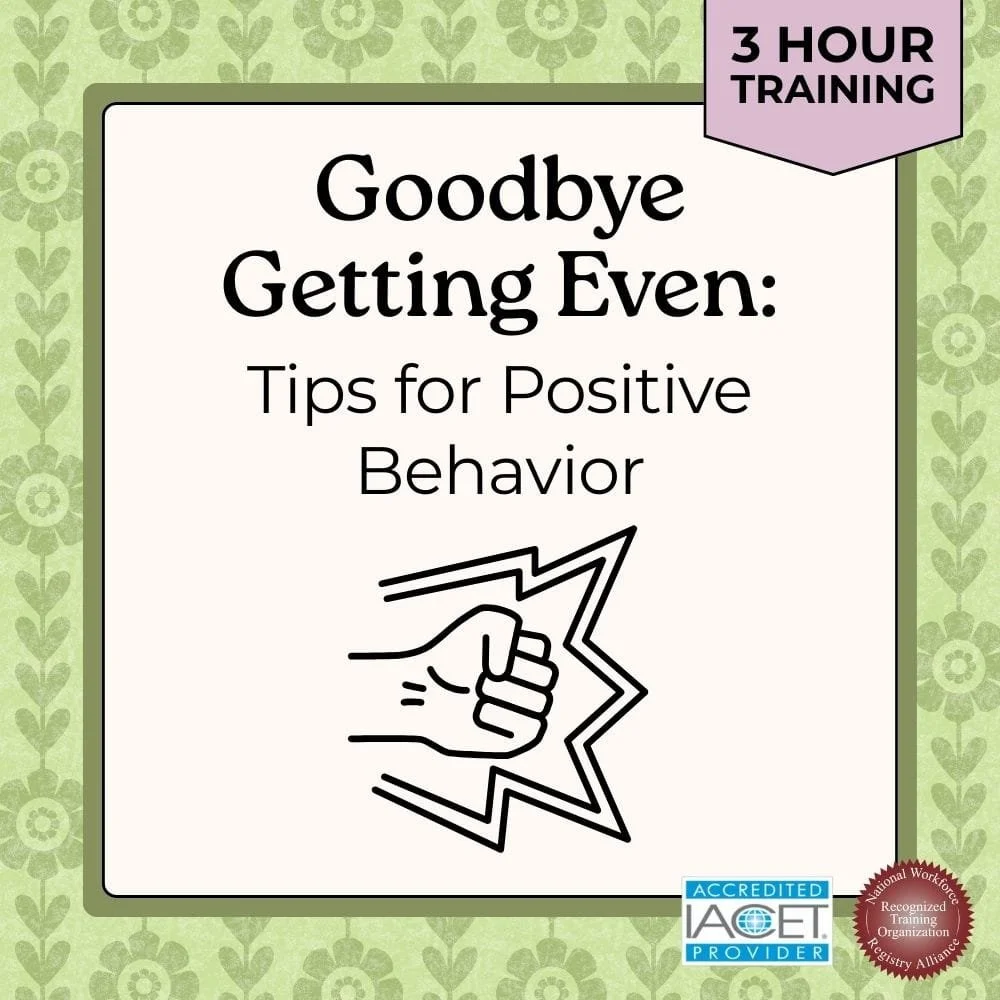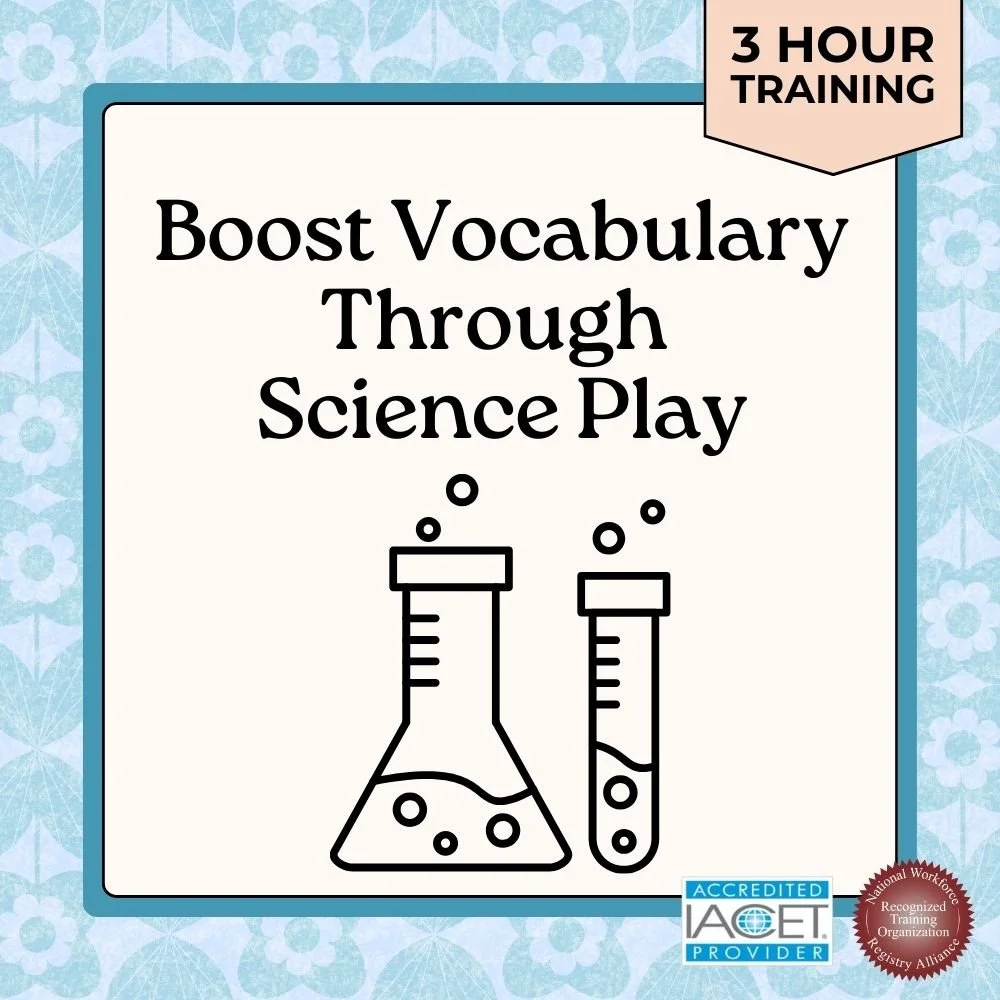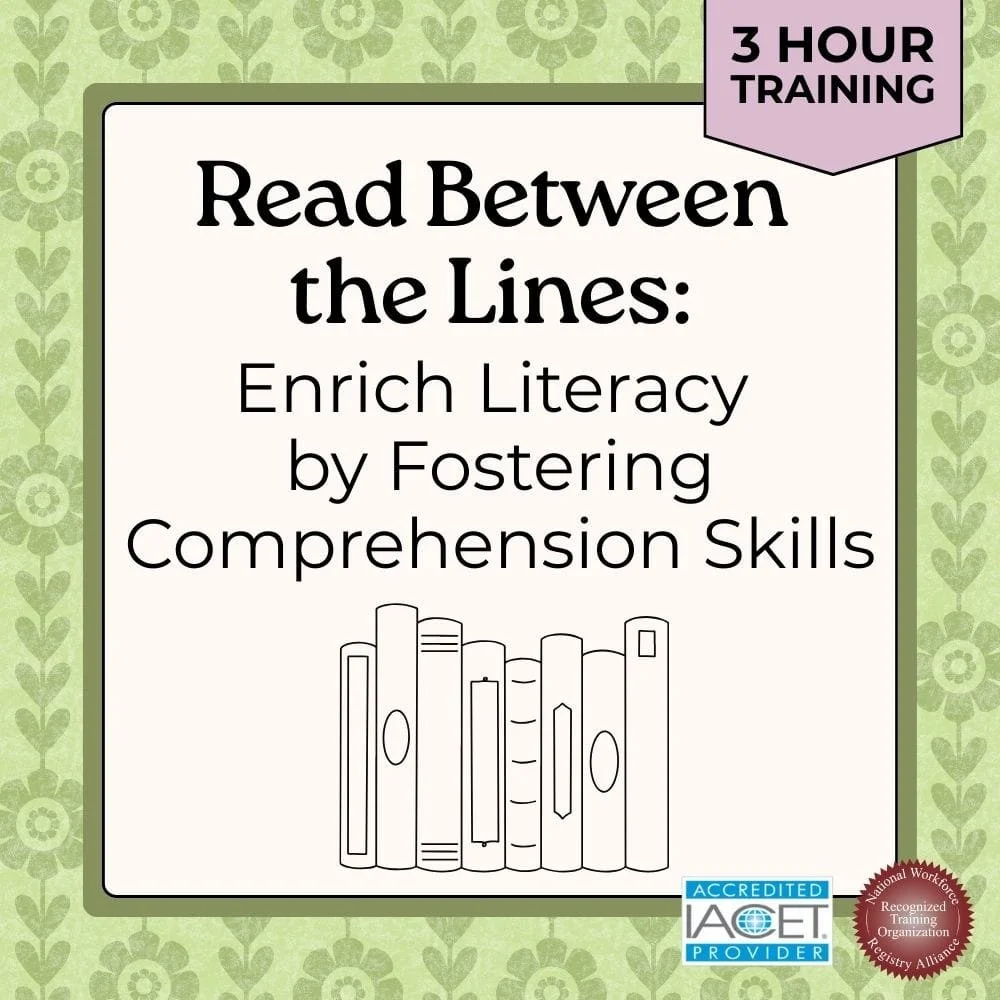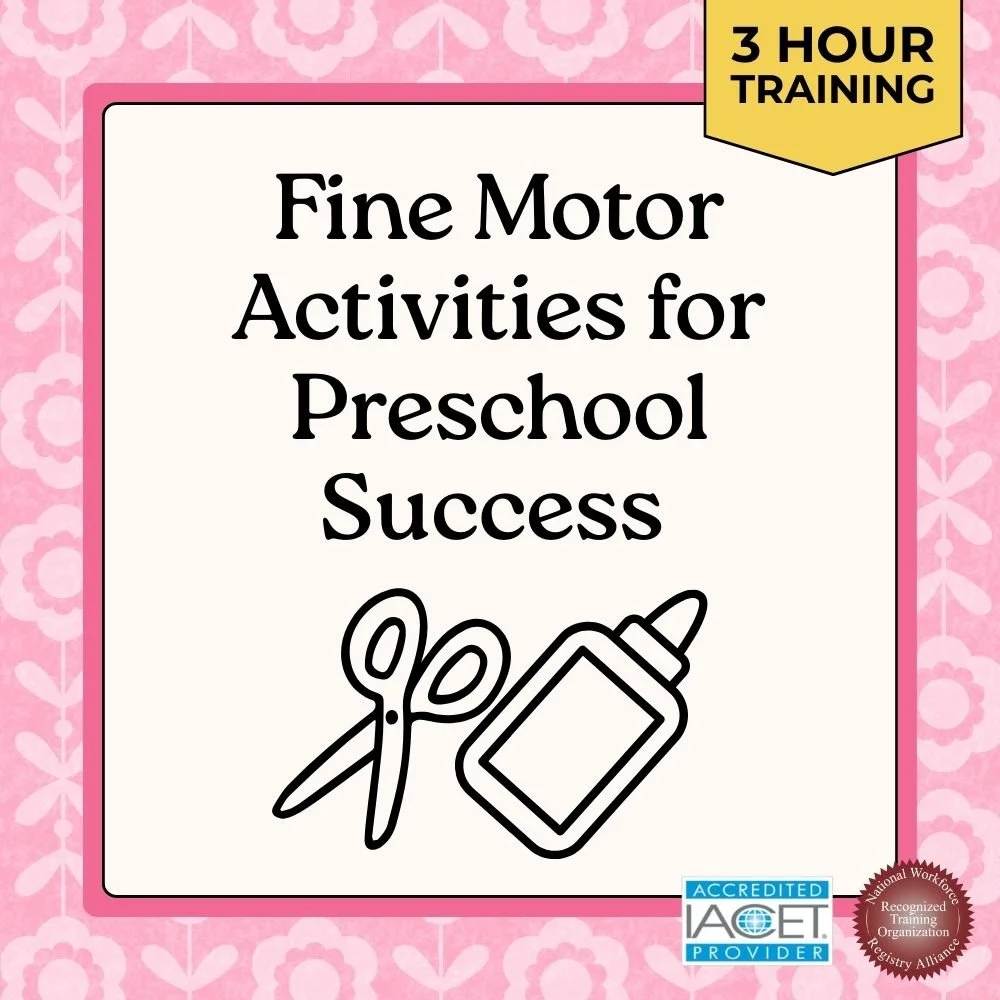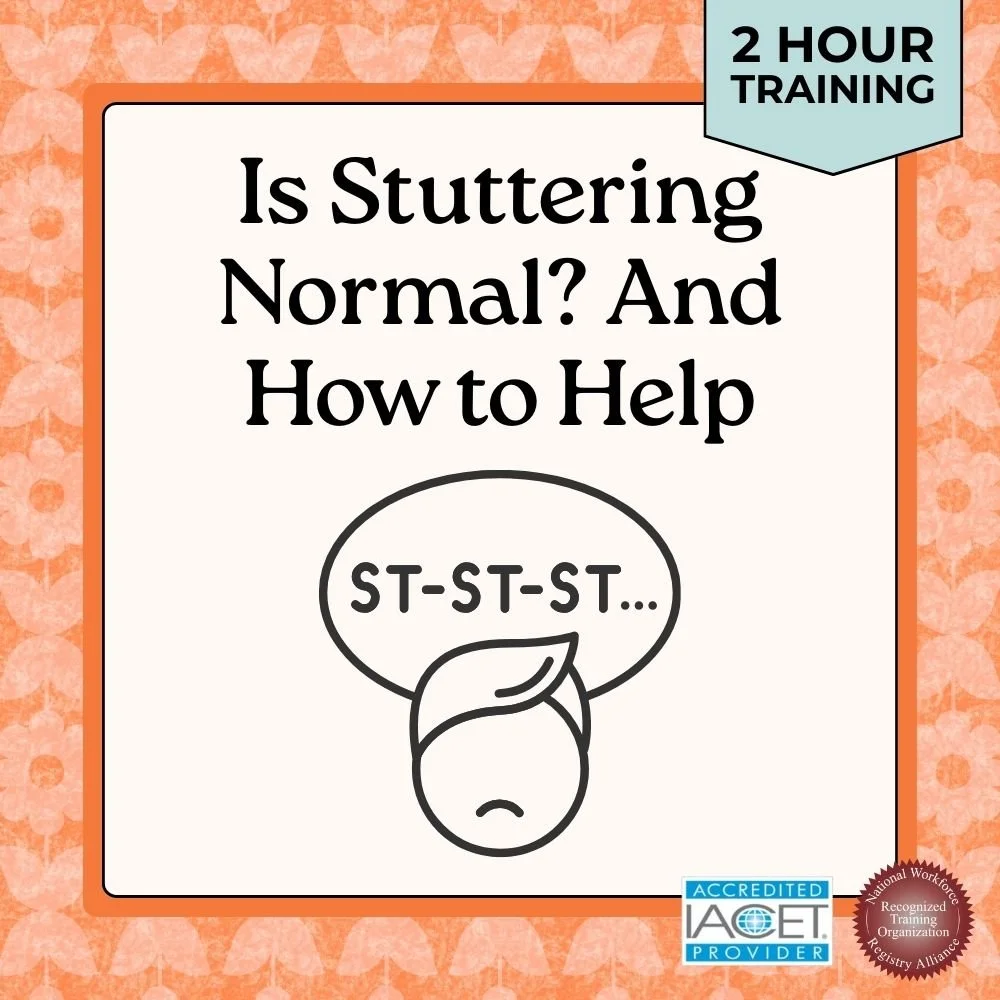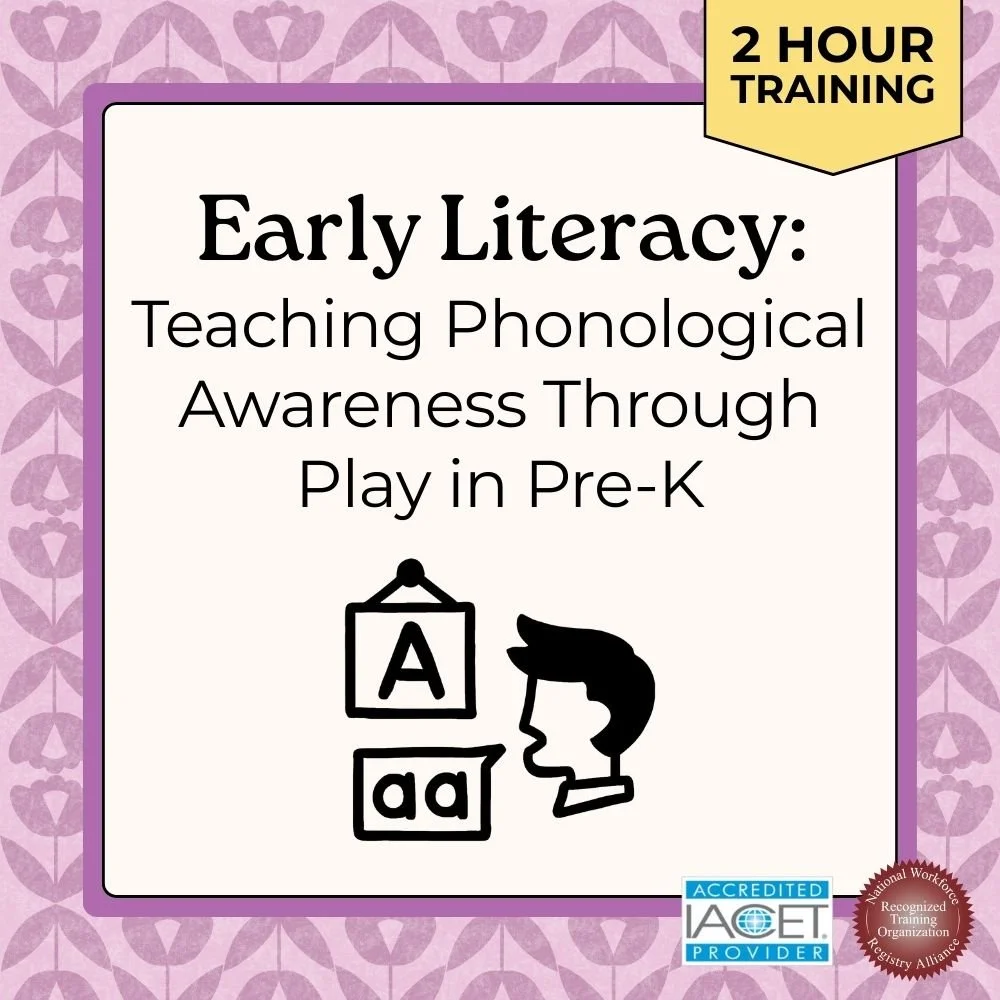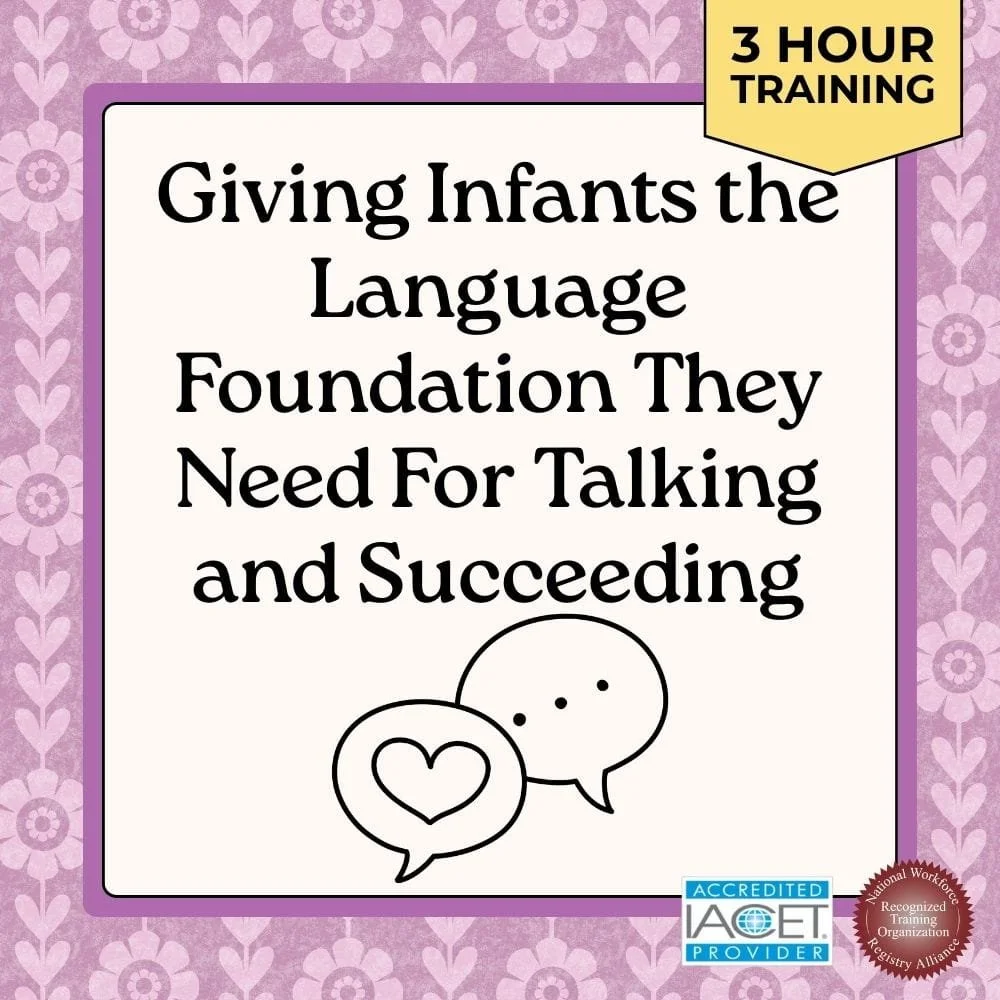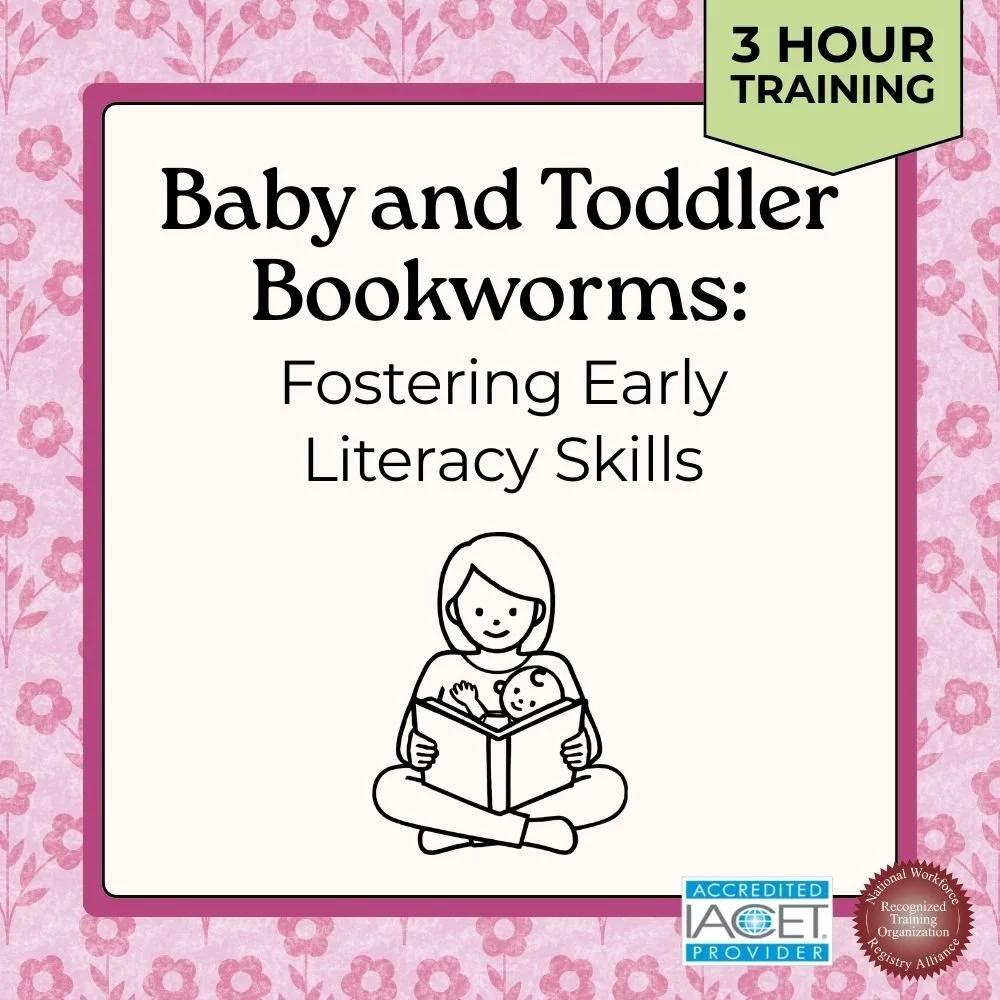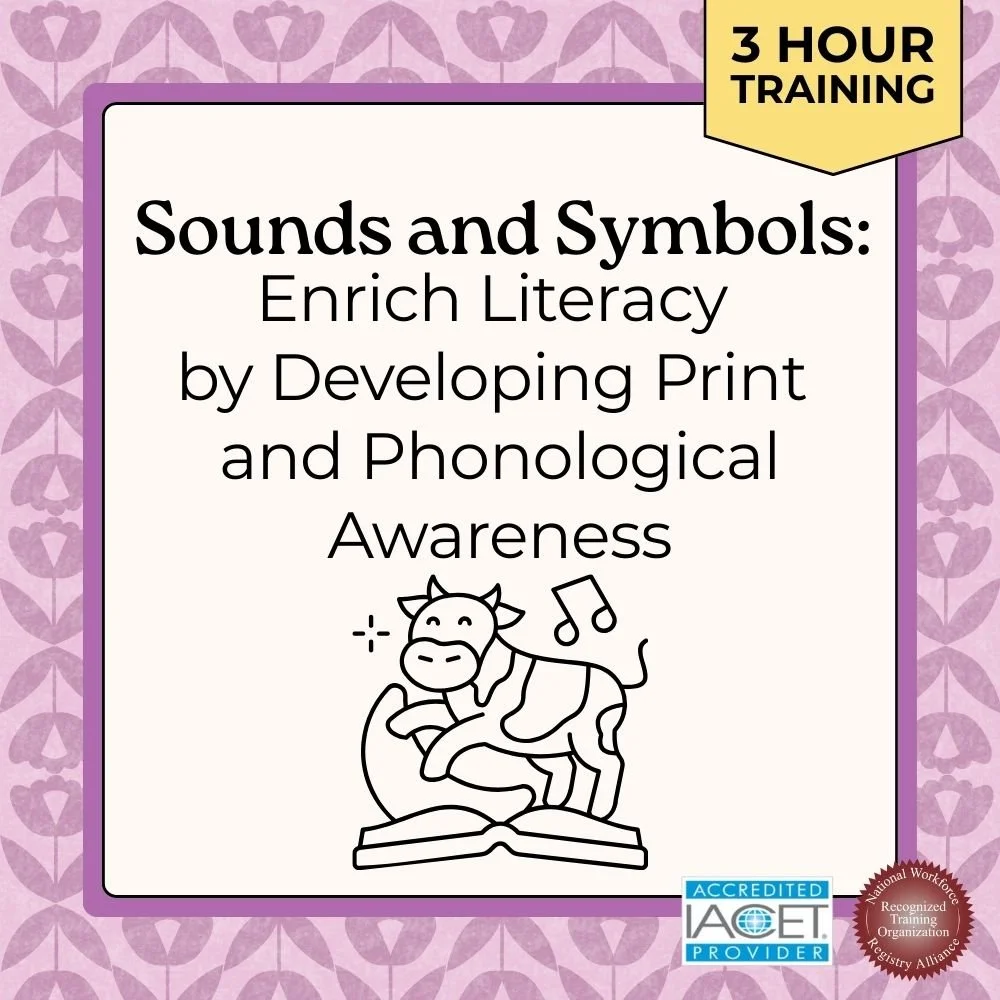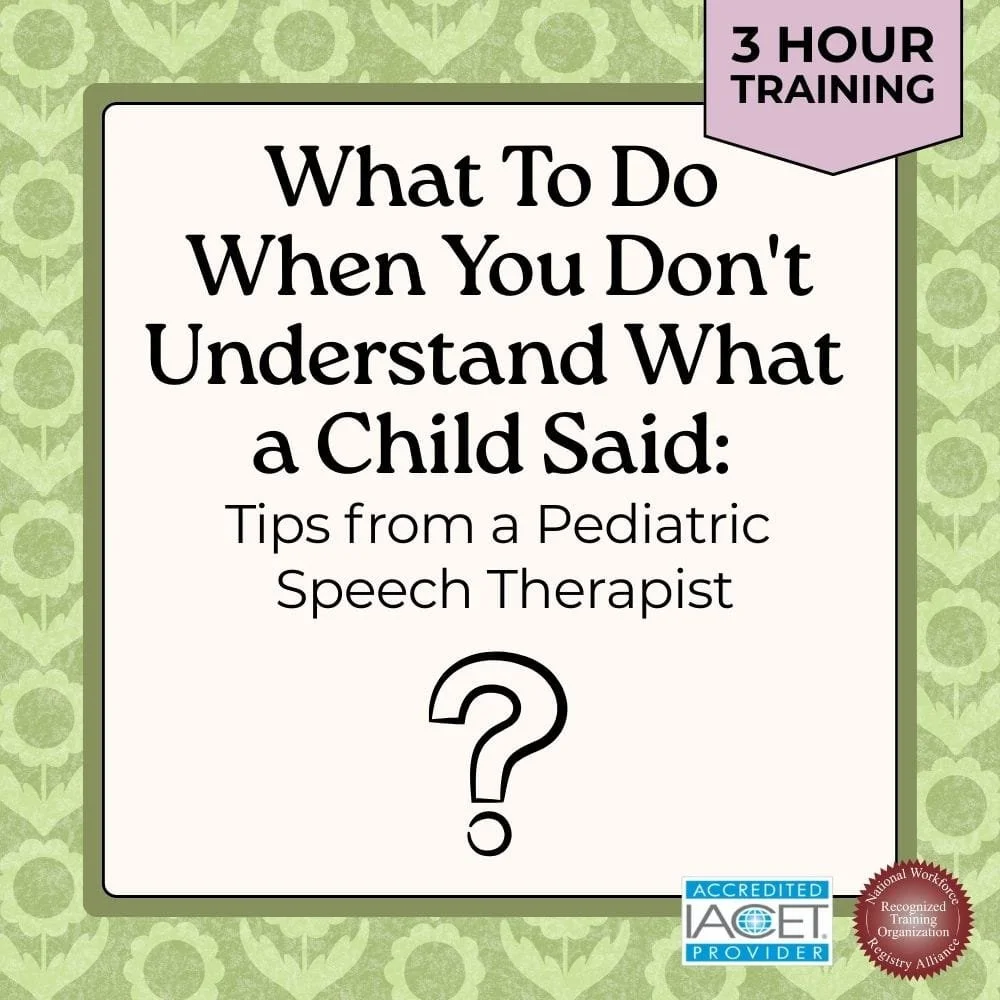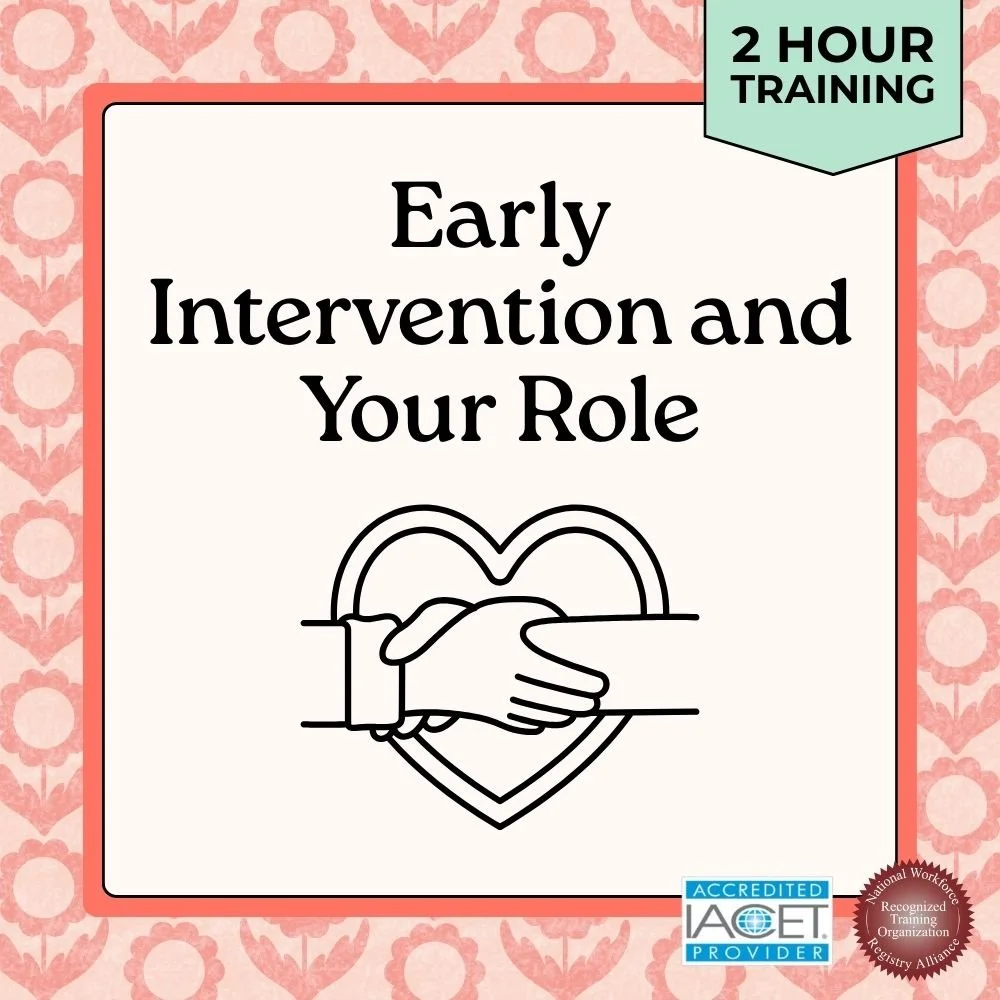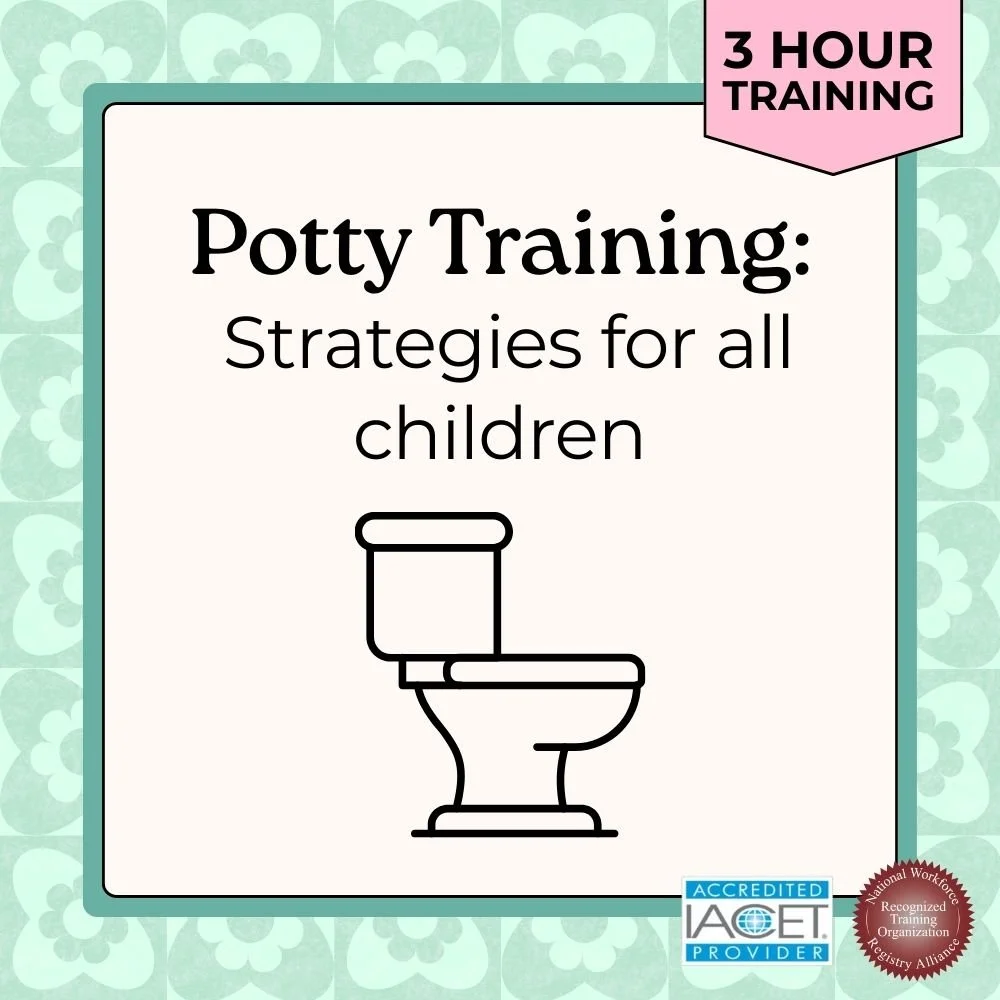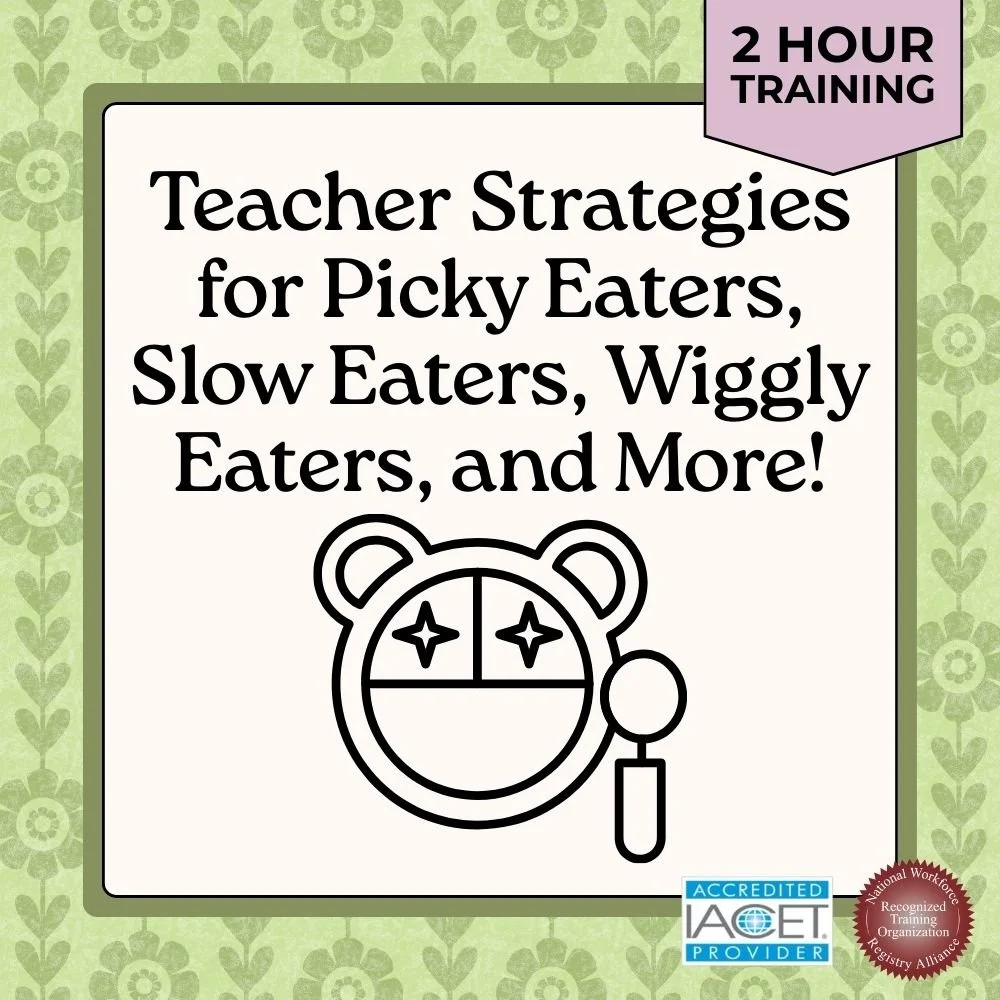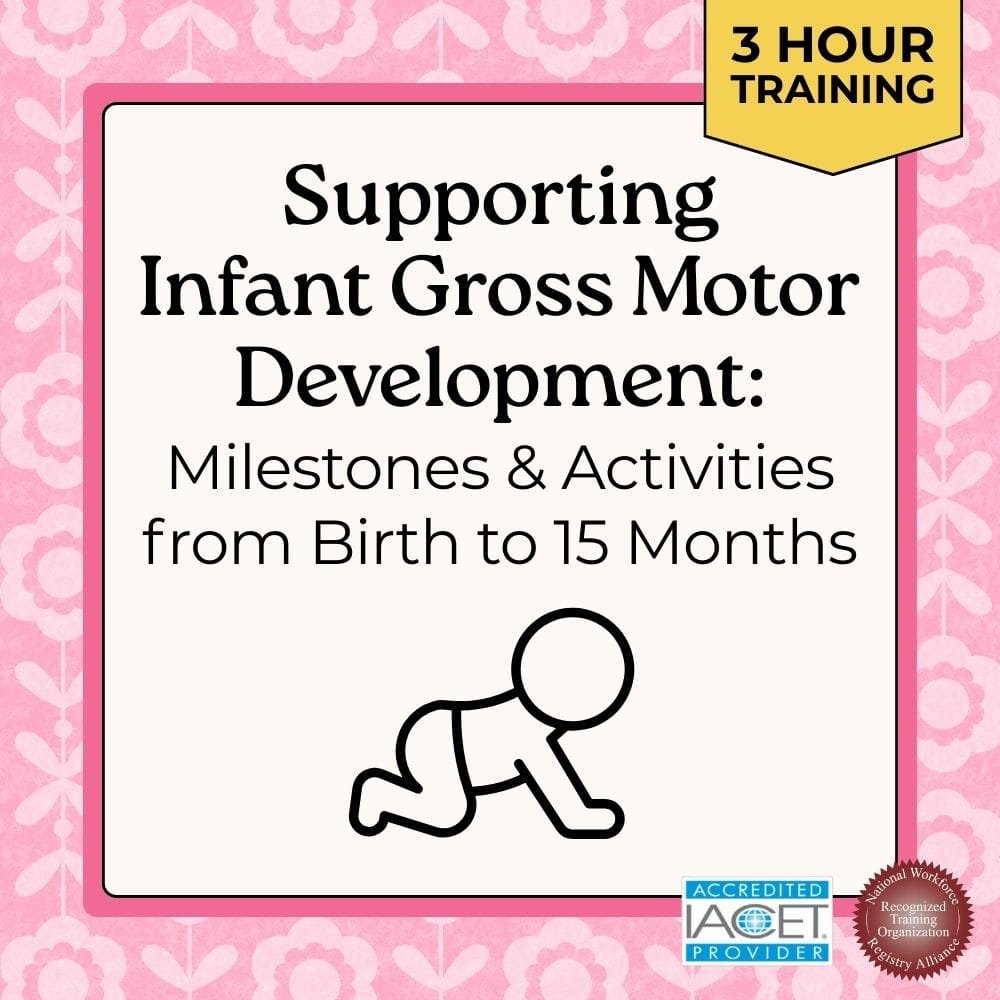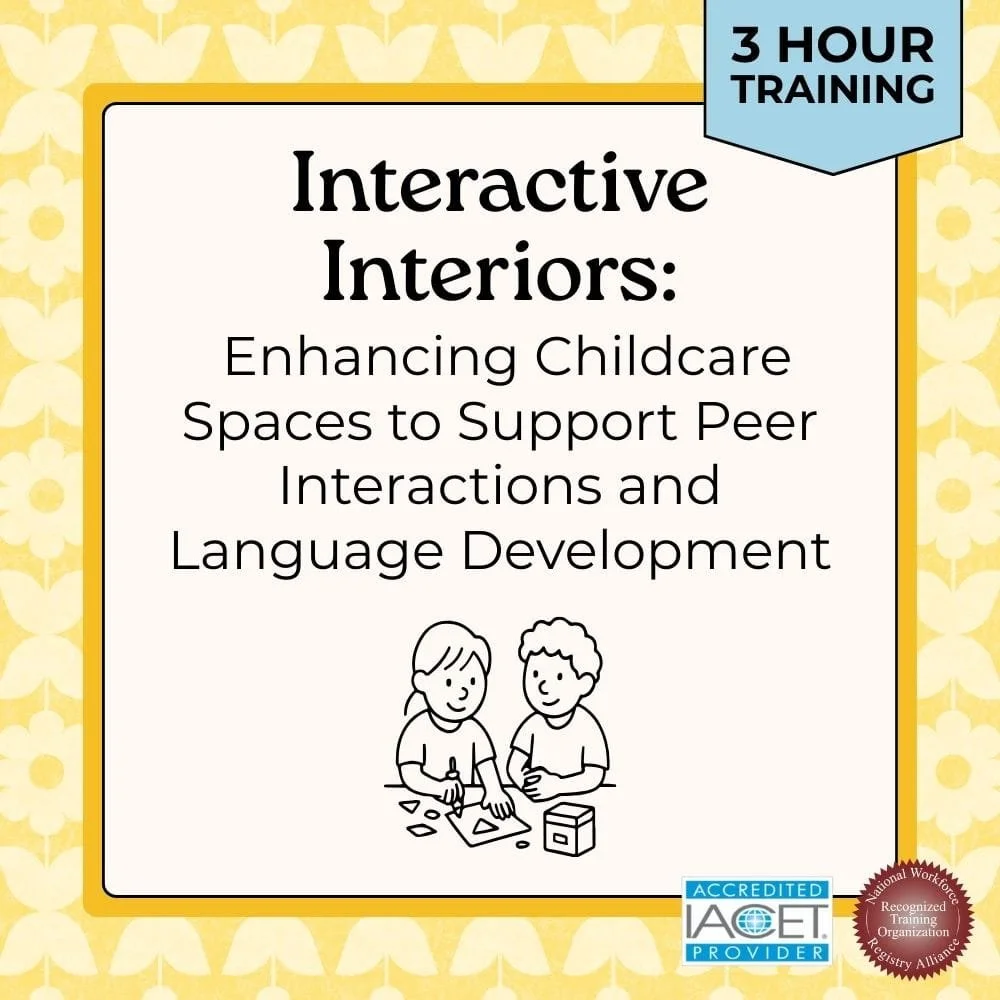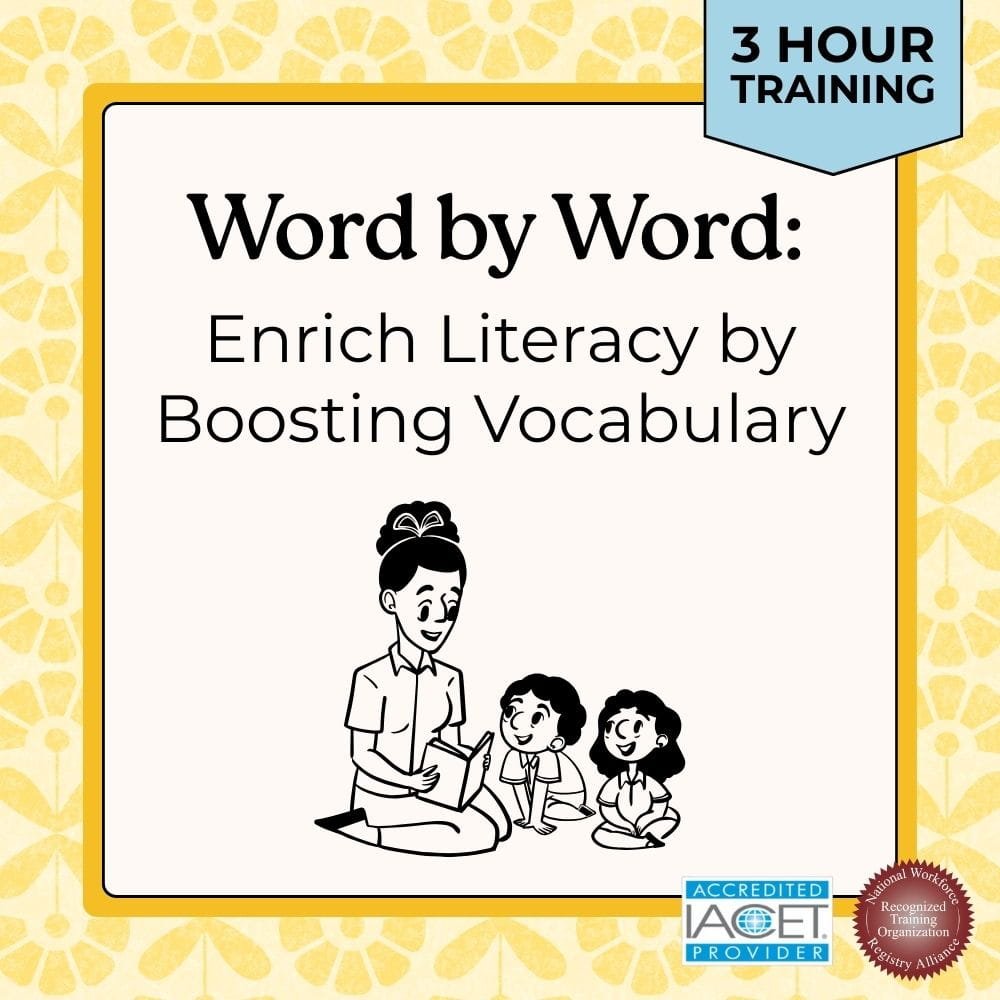Book a training for just your child care
invest in your providers
9 or less participants
$360
10-20 participants
$700
Each participant over 20
$33 per person
Scroll down to see all approved trainings!
Note: The majority of trainings are 3 hours.
-
In this training, participants will delve into understanding and supporting autistic children through a neurodiversity-affirming lens while learning directly from a Pediatric Speech Therapist.
The goal is to equip you with the knowledge of what autism is and is not as well as debunk “old school” ways of supporting children with autism and learn new best practices.
You will leave the training with the tools you need to feel confident caring for a neurodiverse child while supporting their language, sensory processing system, and play!
-
1. Identify the 3 main characteristics of Autism.
2. Identify 5 different ways to support the sensory environment to meet an autistic child’s needs.
3. Identify neurodiversity affirming ways to play with an autistic child.
-
This training is approved for 3 credit hours and 0.3 CEU's in CT, DC, DE, FL, MA, MD, GA, NC, PA, SC, VA, VT, WY
-
Did you know- research shows math language predicts later math AND reading skills!
In this training, you will learn: How gender stereotypes impact math learning, language strategies to support teaching math in ways that littles learn best, and 5 key math concepts to focus on from birth through preschool age.
You will also leave the training with toy, book, and game suggestions to use in your childcare as well as handouts to provide to families so they can support math language at home!
-
1) Participants will describe gender stereotypes and how it impacts math learning.
2) Participants will state what it means to follow the child’s lead and guide the interaction.
3) Participants will name 5 key math concepts to focus on from birth through preschool.
-
This training is approved for 3 credit hours and 0.3 CEU's in CT, DC, DE, FL, MA, MD, GA, NC, PA, SC, VA, VT, WY
-
Gain practical tools to support autistic children in their unique communication journeys.
First you will have a clear understanding of what autism is and how autistic children develop language.
Then you will learn 10 tips to understand what a child may be communicating and how to respond in ways that supports language development.
The research has changed when it comes to best practices for supporting an autistic child’s communication.
Learn the most up to date information right from a speech therapist and feel empowered understanding and fostering communication with autistic children.
NOTE: Research has also changed how we write about autism. The Autism community prefers identity first language (i.e., autistic child) and is considered best neurodiversity affirming practice
-
At the end of this training, you will be able to:
identify strategies that can be used to support communication with autistic children
identify ways to describe how an autistic child is communicating
identify ways to add picture supports to the childcare setting
-
This training is approved for 3 credit hours and 0.3 CEU's in CT, DC, DE, FL, MA, MD, GA, NC, PA, SC, VA, VT, WY
-
From babies first bites of solid foods to troubleshooting challenging meal times with preschoolers- this training provides information on meal time success!
You will learn ways you can support getting baby ready for solids, how to handle picky toddlers, and ways to troubleshoot challenges during meal time like throwing food, food refusal, and more!
This training is also packed with information about the nutritional needs and serving size of littles from birth through preschool to optimize growth and development!
-
1. Participants will identify 5 ways to support getting baby ready for solid foods.
2. Participants will name 1 possible solution to common problems that occur at meal times.
3. Participants will Identify the nutritional needs of children from 6 months to 5 years.
-
This training is approved for 3 credit hours and 0.3 CEU's in CT, DC, DE, FL, MA, MD, GA, NC, PA, SC, VA, VT, WY
-
This training is designed to equip childcare providers with effective strategies to support young children's sensory needs in the child care setting.
This training will explore
how children process sensory information
understand sensory processing differences and disorders
how that impacts behavior
easy to apply tools and techniques to promote regulation, improve focus, and enhance play and learning experiences.
Learn how to create a sensory-friendly environment that fosters calm, engagement, and positive behavior, ensuring every child can thrive in their developmental journey.
-
By the end of the training, participants will:
identify the 3 ways a child may process sensory information
identify sensory strategies that can be used during daily routines to support a child’s sensory needs.
ways to modify the environment to meet a child’s sensory needs
-
This training is approved for 3 credit hours and 0.3 CEU's in CT, DC, DE, FL, MA, MD, GA, NC, PA, SC, VA, VT, WY
-
Looking to incorporate sign language in your childcare? This training is for you!
Learn about the many benefits of using sign language with infants, toddlers, and preschool age children that are both typically developing and have special needs. Then have opportunities to watch videos and practice signs you can use during your everyday routines!
You will also learn ways to incorporate sign into your curriculum and how to create a supportive environment that fosters signs at your childcare and with the children’s families!
-
1) Participants will identify populations of children that benefit from using sign language.
2) Participants will list 3 benefits of signing to infants, toddlers, and preschoolers.
3) Participants will list routines within their day and curriculum where they can implement signing to children.
-
This training is approved for 3 credit hours and 0.3 CEU's in CT, DC, DE, FL, MA, MD, GA, NC, PA, SC, VA, VT, WY
-
The training is designed to equip childcare providers with the knowledge and skills necessary to support and enhance fine motor development.
Participants will learn what fine motor skills develop and when starting at infancy through age 5.
You will leave the training with play ideas, table top activities, and toy suggestions that support later skills for infants, toddlers, and preschoolers.
The training also gives you recommendation for equipment for common skills like pencil grasp and cutting, how to support children with fine motor delays, and FAQ’s (like "Does writing on a tablet support handwriting?") will be answered.
-
1. Identify fine motor milestones for the birth to 5 year old.
2. Identify fine motor activities for infants, toddlers, and preschoolers.
3. Identify strategies to promote pencil grasp and facilitate scissor skills.
-
This training is approved for 3 credit hours and 0.3 CEU's in CT, DC, DE, FL, MA, MD, GA, NC, PA, SC, VA, VT, WY
-
Discover how to support autistic children during play.
First, you will have a clear understanding of what autism is and understand characteristics of autistic play.
Then you will learn how to engage and support autistic children with toys and play activities that fosters connection, compassion, and co-regulation.
Last, you will leave the training with language supports you can use during play to develop an autistic child’s communication skills. This training provides practical techniques for an inclusive play environment that meets the needs of autistic children.
NOTE: Research has also changed how we write about autism. The Autism community prefers identity first language (i.e., autistic child) and is considered best neurodiversity affirming practice.
-
1. By the end of the training, participants will identify the positive impact play has on development
2. By the end of the training, participants will identify how to play with autistic children that fosters positive interactions and development
3. By the end of the training, participants will list the criteria for a supportive language learning environment during play
-
This training is approved for 3 credit hours and 0.3 CEU's in CT, DC, DE, FL, MA, MD, GA, NC, PA, SC, VA, VT, WY
-
This training is designed to equip childcare providers with effective strategies for navigating difficult conversations with parents and guardians.
Childcare providers often encounter challenging situations that require open and respectful communication.
Learn how to prepare for difficult conversations, create solutions, execute a plan, and be able to provide families with additional resources for a range of concerns.
You will leave the training feeling confident when addressing concerns while maintaining a positive relationship with families.
-
1. Name 3 ways to prepare for difficult conversations.
2. Name the 3 elements of an effective solutions plan.
3. Name 2 different resources you can provide families with if they have concerns about their child’s development.
-
This training is approved for 3 credit hours and 0.3 CEU's in CT, DC, DE, FL, MA, MD, GA, NC, PA, SC, VA, VT, WY
-
This training is designed to equip childcare providers with effective strategies for fostering positive behaviors in their childcare setting.
Participants will learn the main reasons why children misbehave and deep dive into power struggles.
You will learn proactive techniques to reduce power struggles, encourage desirable behaviors, and learn to address power struggles in the moment.
By the end of this very interactive training, you will feel empowered implementing positive discipline strategies to support long term behavior change!
-
1) Identify what a child really wants when they engage in power struggles.
2) Identify ways you can prevent misbehavior before it happens.
3) Identify ways you can respond to and redirect misbehavior.
-
This training is approved for 3 credit hours and 0.3 CEU's in CT, DC, DE, FL, MA, MD, GA, NC, PA, SC, VA, VT, WY
-
Dive into the world of sensory play and discover its many benefits for infants and toddlers!
This engaging 3 hour training highlights the 8 sensory systems and provides a variety of ideas for fun, low cost-no cost, easy-to-implement sensory activities aligned to each of the 8 systems.
There are many benefits of sensory play- from fostering cognitive and language development to building emotional regulation.
Leave feeling equipped with tools and ideas to create a sensory-rich environment for children birth through age 3 that nurtures every child's development!
-
At the end of the training, participants will
identify activities they can do to support the development of the sensory system
identify the benefits of sensory play on a child's development.
select materials needed for sensory play
-
This training is approved for 3 credit hours and 0.3 CEU's in CT, DC, DE, FL, MA, MD, GA, NC, PA, SC, VA, VT, WY
-
This training is designed to equip childcare providers with effective strategies for fostering positive behaviors in their childcare setting. Participants will learn the main reasons why children misbehave and deep dive into attention seeking behaviors.
You will learn proactive techniques to reduce attention seeking behaviors, encourage desirable behaviors, and learn to address behaviors in the moment.
By the end of this very interactive training, you will feel empowered implementing positive discipline strategies to support long term behavior change!
-
1) Identify what a child really wants when they use attention seeking behaviors.
2) Identify ways you can prevent misbehavior before it happens.
3) Identify ways you can respond to and redirect misbehavior.
-
This training is approved for 3 credit hours and 0.3 CEU's in CT, DC, DE, FL, MA, MD, GA, NC, PA, SC, VA, VT, WY
-
This training is designed to equip childcare providers with effective strategies for fostering positive behaviors in their childcare setting.
Participants will delve into the main reasons why children misbehave and deep dive into aggressive behaviors.
You will learn proactive techniques to reduce aggressive behaviors, encourage desirable behaviors, and learn to address behaviors in the moment.
By the end of this very interactive training, you will feel empowered implementing positive discipline strategies to support long term behavior change!
-
1) Identify what a child really wants when they use aggressive behaviors.
2) Identify ways you can prevent misbehavior before it happens.
3) Identify ways you can respond to and redirect misbehavior.
-
This training is approved for 3 credit hours and 0.3 CEU's in CT, DC, DE, FL, MA, MD, GA, NC, PA, SC, VA, VT, WY
-
Boost Vocabulary Through Science Play is designed for child care providers caring for toddler through preschool age children.
This training focuses on evidence-based practices for teaching vocabulary in natural, meaningful contexts while sparking curiosity through Science exploration.
Participants will learn how to integrate vocabulary for each of the 5 science domains into everyday routines, hands on activities, books, and toy, sensory, and imaginative play.
By the end of the session, providers will leave with a toolkit for boosting vocabulary development (which leads to later academic success!) and foster a love for Science.
-
At the end of this training, you will be able to:
1) identify the importance of science lessons in child care
2) select science activities to use in their child care
3) identify a variety of materials that can be used in science activities
-
This training is approved for 3 credit hours and 0.3 CEU's in CT, DC, DE, FL, MA, MD, GA, NC, PA, SC, VA, VT, WY
-
SStrong emergent literacy skills are directly related to later academic success. One piece of the emergent literacy puzzle is comprehension.
Want to help children truly understand the stories you read together?
Learn simple, powerful ways to support children's comprehension, language development, and retelling skills.
Leave the training with ready-to-use tools like story cards, question prompts, and hands-on ideas for small group & whole group reading.
-
At the end of this training, you will be able to:
identify the importance of teaching the early literacy skill of comprehension
identify key story grammar elements to include in read-a-louds
identify supports that can be added to a read-a-loud to make them hands on experiences
-
This training is approved for 3 credit hours and 0.3 CEU's in CT, DC, DE, FL, MA, MD, GA, NC, PA, SC, VA, VT, WY
-
This training provides information on language developmental milestones from 1-3 years old so caretakers know what to expect and when, when it comes to a toddler’s language development.
Providers will learn quick and easy strategies to support language development that can be implemented throughout the day, during natural routines.
The strategies are proven to support higher oral vocabulary through toddlerhood, stronger social connections, and academic success at school age.
-
1) Participants will identify expressive and receptive language developmental milestones for babies ranging in age from 1 to 3 years old.
2) Participants will identify 3 benefits (short and/or long term benefits) to providing a strong language foundation in toddlerhood.
3) Participants will name language boosting strategies that support language development in toddlers.
4) Participants will name daily routines that are part of the providers everyday schedule where they can implement learned strategies.
-
This training is approved for 3 credit hours and 0.3 CEU's in CT, DC, DE, FL, MA, MD, GA, NC, PA, SC, VA, VT, WY
-
As a child care provider, you play a crucial role in helping children say their first words! This training is designed for providers working with infants and young toddlers ages birth – 15 months.
Learn the top strategies to move babies from babbling to independently using first words. At the end of the training, you will feel confident implementing strategies immediately and effectively into playtime and care routines.
-
At the end of the training, providers will
1. Identify 3 strategies that develop language skills with infants
2. Identify language milestones expected in infancy
3. Identify benefits to using language strategies with infants
-
This training is approved for 2 credit hours and 0.2 CEU's in CT, DC, DE, FL, MA, MD, GA, NC, PA, SC, VA, VT, WY
-
Are you noticing children struggle with holding crayons, using scissors, or forming letters?
This training gives you practical, play-based strategies to build the foundation for strong hands and successful writing and cutting. We cover:
Developmental milestones
Easy-to-implement fine motor play
How to support proper grasp development
The natural stages of drawing
Which letters to teach a child to write first and why
Simple ways to introduce scissor skills that actually work.
You will leave the training with tools and tips for fine motor success with preschoolers
-
At the end of the training, participants will
1)
-
This training is approved for 3 credit hours and 0.3 CEU's in CT, DC, DE, FL, MA, MD, GA, NC, PA, SC, VA, VT, WY
-
Do you ever feel unsure how to respond when a child in your classroom struggles to get their words out?
This practical, evidence based training is taught by a pediatric speech language pathologist and helps child care and preschool teachers understand what stuttering really is, what’s typical in early childhood, and when a referral may be needed.
You’ll also learn exactly how to respond when a child is stuck on a word or sound using simple, supportive, and teacher friendly strategies that reduce pressure, build confidence, and encourage participation.
By the end of the training you will feel confident, prepared, and empowered to support every child you care for and teach!
-
By the end of the training, participants will
Explain what preschool stuttering is (and isn’t)
Name a supportive communication strategy that can be used in the classroom when a child stutters
Partner with families and know when/how to suggest a referral
-
This training is approved for 3 credit hours and 0.3 CEU's in CT, DC, DE, FL, MA, MD, GA, NC, PA, SC, VA, VT, WY
-
Phonological awareness is one of the most important prereading skills in early literacy development and the number one predictor of future reading success.
Unfortunately, it is often misunderstood or overshadowed by letter instruction.
This training is designed specifically for teachers of 3 – 5 year olds who want clear practical guidance on teaching phonological and phonemic awareness skills.
This training breaks down:
What phonological and phonemic awareness really are
Why they matter
How to teach them in developmentally appropriate, play-based ways that fit naturally into a busy day.
Teachers will leave feeling more confident teaching early literacy with 30+ low-prep and no-prep activities that can be used the very next day, using materials already in the classroom, no worksheets, no scripted curriculum, and no added stress.
-
By the end of the training participants will:
Identify the most important phonological awareness skills to focus on
Identify best practices for how to teach phonological awareness skills
Identify an activity that works on phonological awareness skills
-
This training is approved for 3 credit hours and 0.3 CEU's in CT, DC, DE, FL, MA, MD, GA, NC, PA, SC, VA, VT, WY
-
This training provides information on language developmental milestones during the first year so caretakers know what to expect and when, when it comes to a baby’s language development.
Providers will learn quick and easy strategies to lay the communication foundation that can be implemented throughout the day, during natural routines.
The strategies are proven to support higher oral vocabulary in toddlerhood, stronger social connections, and academic success at school age.
-
1) Participants will identify expressive and receptive language developmental milestones for babies ranging in age from birth to 15 months.
2) Participants will identify 3 benefits (short and/or long term benefits) to providing a strong language foundation in infancy.
3) Participants will list 7 language boosting strategies that support language development in infants.
4) Participants will name daily routines that are part of the providers everyday schedule where they can implement learned strategies.
-
This training is approved for 3 credit hours and 0.3 CEU's in CT, DC, DE, FL, MA, MD, GA, NC, PA, SC, VA, VT, WY
-
Learn simple strategies to maximize a child’s development using toys and materials you already have.
This interactive training is designed for child care providers working with toddlers aged 18 - 36 months.
Explore how common toys and every day objects can be transformed to target language growth and strengthen fine motor skills.
You’ll learn specific language and fine motor strategies that support development and gain fresh ideas for play-based learning that you can implement immediately in your child care.
-
By the end of the training participants will:
1. Identify language and fine motor developmental milestones for ages 18 months-36 months
2. Identify strategies that can be intentionally used during play to support development.
3. Identify ways to combine toys and materials to develop activities that meet milestones
-
This training is approved for 2 credit hours and 0.2 CEU's in CT, DC, DE, FL, MA, MD, GA, NC, PA, SC, VA, VT, WY
-
It can be frustrating for both you and a child when you don’t understand what they said. This training provides information on speech sound development from 1-6 years old so you know what sounds a child should be saying at specific ages.
You will feel confident using strategies to support speech sound development and respond in ways that reduces frustrations when you have no clue what a child says.
These strategies can be implemented throughout the day, during natural routines! You will also learn the answers to frequently asked questions such as how to support dual language learners speech, when to be concerned, and common things that have a negative impact on sound development.
*Note: This training is a shorter version of the What To Do When You Do Not Understand What A Child Says training.
-
At the end of the training,
1) Participants will identify at least one way to respond that increases speech sound development
2) Participants will identify at least one way to respond when you do not understand what a child said
3) Identify a negative impact speech sound disorders have on children
-
This training is approved for 2 credit hours and 0.2 CEU's in CT, DC, DE, FL, MA, MD, GA, NC, PA, SC, VA, VT, WY
-
Stop dreading challenging behaviors and start feeling equipped to handle them. Leave the training with a strong understanding of why children display certain behaviors and have quick strategies for the behaviors you face daily:
Children who struggle during transitions
Kids who bite or hit
The ones who just don’t listen.
You will also learn proactive techniques to prevent behaviors before they start.
Through interactive activities, real-life scenarios, and hands-on practice, you'll gain confidence to support children while maintaining a calm, positive environment.
-
By the end of the training, participants will identify what a child really wants when they engage in undesirable behaviors
By the end of the training, participants will identify ways you can prevent misbehavior before it happens
By the end of the training, participants will identify ways you can respond to and redirect misbehavior
-
This training is approved for 3 credit hours and 0.3 CEU's in CT, DC, DE, FL, MA, MD, GA, NC, PA, SC, VA, VT, WY
-
Learn practical strategies to support feeding development and decrease mealtime struggles in infants, toddlers, and preschoolers.
This training focuses on your most common concerns at each stage in development.
Are they eating enough?
What do we do if they only eat purees?
How to handle food throwing.
What to do when they won’t sit at the table?
Tips for supporting picky eaters.
No professional jargon, just easy to use strategies you can implement immediately in your classrooms or child care settings the very next day!
-
At the end of the training, providers will identify how much to feed babies
At the end of the training, providers will identify strategies to decrease food throwing
At the end of the training, providers will identify strategies to support picky eaters
-
This training is approved for 3 credit hours and 0.3 CEU's in CT, DC, DE, FL, MA, MD, GA, NC, PA, SC, VA, VT, WY
-
This training is designed to enhance your understanding of early literacy development in infants and toddlers and give you strategies to foster a child’s love of reading!
You will learn literacy milestones from birth-3 years, understand why reading matters, what to look for in books for this age, how to create a literacy rich environment, establish reading routines, and more!
Best of all, you will leave with tools to solve common reading struggles you probably encounter when reading to infants and toddlers.
By the end of the training, you will feel equipped to support language and literacy development with infants and toddlers!
-
1. Identify strategies to read to infants and toddlers that supports language and literacy development.
2. Identify different way(s) to rotate books that supports literacy and language.
3. Identify how to create a literacy rich environment.
-
This training is approved for 3 credit hours and 0.3 CEU's in CT, DC, DE, FL, MA, MD, GA, NC, PA, SC, VA, VT, WY
-
Strong emergent literacy skills in early childhood are key predictors of later academic success. This training explores how phonological awareness, print awareness, and alphabet knowledge work together to support early reading development.
You will learn how to intentionally build these skills through playful, developmentally appropriate activities and routines and leave with practical strategies to create a literacy-rich environment.
-
Identify developmentally appropriate strategies to support early literacy skills with 3-5 year olds
Identify activities/approaches that promote print knowledge, alphabet knowledge, and phonological awareness
Identify what print concepts children need to learn through guided practice before school age
-
This training is approved for 3 credit hours and 0.3 CEU's in CT, DC, DE, FL, MA, MD, GA, NC, PA, SC, VA, VT, WY
-
It can be frustrating for both you and a child when you don’t understand what they said. This training provides information on speech sound development from 1-6 years old so caretakers know what sounds a child should be saying at specific ages.
Providers will learn quick and easy strategies to support speech development and respond in ways that reduces frustrations.
These strategies can be implemented throughout the day, during natural routines!
Providers will also learn the answers to frequently asked questions such as how to support dual language learners speech, when to be concerned, and common things that have a negative impact on sound development.
-
1) Participants will name early developing and later developing sounds.
2)Participants will name 3 RIGHT WAYS to respond that increase speech sound development.
3) Participants will demonstrate how to respond when you do not understand what a child said.
4) Answer FAQ’s that relate to speech sound development.
-
This training is approved for 3 credit hours and 0.3 CEU's in CT, DC, DE, FL, MA, MD, GA, NC, PA, SC, VA, VT, WY
-
As a child care provider, you play a vital role in shaping young lives—and you’re often the first to notice when a child might need extra support. But what comes next?
In this training, you'll gain the knowledge and confidence to recognize developmental delays, approach families with compassion, learn the early intervention referral process, and collaborate with early intervention specialists to ensure every child thrives.
-
At the end of the training, participants will:
1) identify programs, terms, and resources that support children with special needs
2) name the referral process for 0-3 and 3-5 year olds
3) select best ways to collaborate with other providers
-
This training is approved for 2 credit hours and 0.2 CEU's in CT, DC, DE, FL, MA, MD, GA, NC, PA, SC, VA, VT, WY
-
Learn developmentally appropriate and research-backed strategies for supporting all children learning to use the potty.
We focus on 10 essential skills children need for potty success and you will learn quick tips when working on each skill!
We also cover how to respond to challenges such as accidents, refusal, and constipation— even when you're the only adult in the room.
This training includes special emphasis on supporting children with developmental delays and/or differences and partnering effectively with families for long term success.
You will leave the training with book suggestions, picture schedules, visual sequence cards, sensory tools, and more.
-
At the end of the training, participants will
1)
-
This training is approved for 3 credit hours and 0.3 CEU's in CT, DC, DE, FL, MA, MD, GA, NC, PA, SC, VA, VT, WY
-
In this training, you’ll learn simple and teacher-friendly strategies to support picky eaters, slow eaters, wiggly eaters, and other mealtime challenges common with preschool age children.
You will leave the training with strategies that actually work in classroom settings, have less stress at the table, and help children eat with confidence while learning directly from a Pediatric Speech Language Pathologist and Early Intervention Specialist.
-
By the end of the training, providers will identify strategies to support picky eaters
By the end of the training, providers will identify developmentally appropriate strategies to encourage children to stay sitting at the table
By the end of the training, providers will identify ways to include a child’s family background into meals and other parts of the day
-
This training is approved for 3 credit hours and 0.3 CEU's in CT, DC, DE, FL, MA, MD, GA, NC, PA, SC, VA, VT, WY
-
This training is designed to elevate your understanding and practice of play-based learning with infants and toddlers.
You will explore fun and unique ways to engage infants and toddlers with toys that promote cognitive and language development and understand the significance of play positions to support sensory, fine, and gross motor skill development.
You will also learn strategies to support infants and toddlers when play is not going well or they are having trouble with play transitions (like clean up!).
The training is packed full of ready to do activities, video examples, toy suggestions, and more so you feel confident and empowered playing with infants and toddlers in ways that supports holistic development!
-
1) By the end of the training, participants will identify characteristics of play-based learning.
2) By the end of the training, participants will identify 3 benefits of play related to infant and toddler development.
3) By the end of the training, participants will recall ways to use play and play positions to support development.
-
This training is approved for 3 credit hours and 0.3 CEU's in CT, DC, DE, FL, MA, MD, GA, NC, PA, SC, VA, VT, WY
-
Learn age-appropriate gross motor milestones from birth through 15 months, including rolling, sitting, crawling, standing, and walking.
“When to be concerned” indicators are also included so you know what to watch for and when to seek additional support.
Leave the training with 25 low-prep, developmentally appropriate activities to help babies reach their gross motor milestones that can be implemented immediately using materials commonly found in an infant classroom or home child care.
Activities are designed to work in small spaces, large classrooms, indoors, outdoors, and on a budget!
-
By the end of the training, providers will identify gross motor milestones for infants and young toddlers
By the end of the training, providers will identify developmentally appropriate activities to support gross motor development
By the end of the training, providers will identify ways to collaborate with families when there is a concern
-
This training is approved for 3 credit hours and 0.3 CEU's in CT, DC, DE, FL, MA, MD, GA, NC, PA, SC, VA, VT, WY
-
This training explores strategies behind creating interactive and engaging interiors that stimulate language development and peer interactions.
We will delve into principles for effective interactions between you and the children you care for, classroom design that supports peer interactions, and practical strategies for grouping children for maximum engagement.
We will also problem solve how to support children that are not engaging socially with their peers.
By the end of the training, you will feel confident optimizing your furniture and layout, establishing learning centers, supporting language development, and fostering positive peer interactions.
-
Identify the two main elements that make an interactive classroom.
Name at least 1 way you can arrange the environment to promote interactions.
Identify the best way to group children for learning experiences.
Identify ways to involve children with delays in peer play.
-
This training is approved for 3 credit hours and 0.3 CEU's in CT, DC, DE, FL, MA, MD, GA, NC, PA, SC, VA, VT, WY
-
Strong emergent literacy skills are directly related to later academic success. One piece of the emergent literacy puzzle is vocabulary.
In this training, you will
learn the importance of strong vocabulary skills on later academic success
how intentionally teach vocabulary during book reading activities so they words actually stick
leave the training with book suggestions, a planning tool, and confidence supporting early literacy
-
At the end of the training, participants will
1) identify strategies for how to teach children vocabulary through play, routines, and books
2) list the criteria for choosing books and vocabulary words that align with best practices
3) identify what is needed to create an environment which supports the development of language, vocabulary, and emergent literacy
-
This training is approved for 3 credit hours and 0.3 CEU's in CT, DC, DE, FL, MA, MD, GA, NC, PA, SC, VA, VT, WY
✔ Find a training or trainings right for your center
✔ Fill out an interest form (below)
✔ Bridging Child Development will be in touch with you within 48 hours to schedule
✔ Looking for more than 3 hours? You can combine any 2 trainings for a 6 hour training


